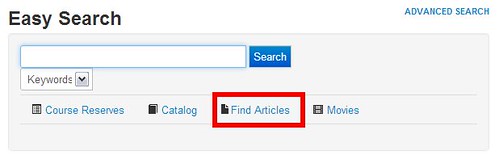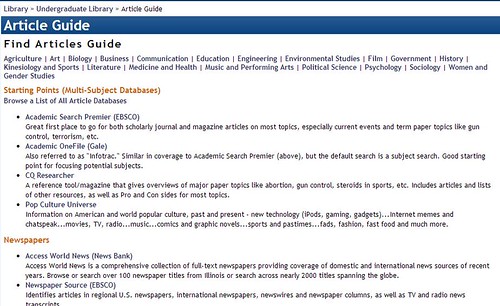You know this has happened to you more than once (or, if it hasn’t, you can bet that it’s coming): your professor gives you an assignment that involves finding peer-reviewed articles. Upon hearing those words you catch your breath, sink a little lower in your seat, and open your calendar to block off Saturday and Sunday with the words: “@ the LIBRARY :(“.
Fear not! Finding scholarly, peer-reviewed articles as part of your research process is actually not quite as dreadful as it might sound. At the UGL, we have created several resources to make your research process a lot easier. Last week, we featured our Subject Guides, research guides created around specific topics, and this week we want to introduce some of the basics on where to go to find peer-reviewed articles.
First: what does “peer-reviewed” mean? We often use the terms “peer-reviewed” and “scholarly” interchangeably. Peer-reviewed articles are (typically) long, research articles published in scholarly journals. They are called peer-reviewed because when they are submitted for publication, a committee of experts in the author’s field reviews the research to determine if it is worthy of publication. The information in scholarly, peer-reviewed articles is authoritative and credible–that review process helps to make sure of it.
Make sense? OK, on to finding them. Scholarly articles come from scholarly research journals, which are easily accessible from library databases. The best place to start when looking for peer-reviewed articles from databases in most disciplines (in our humble opinion) is the UGL’s Find Articles Guide.
To get there, go the UGL’s home page and look for the ‘Find Articles’ button underneath the Easy Search box (see image above). Click on it – you want to ‘find articles,’ right?

Then you’ll arrive at the following page:

Our Find Articles Guide is organized by subject area. We give you a basic list of the central databases in each field as a general starting point for most research.
Library databases come in many forms: some are general, like Academic Search Premier and Academic OneFile, which means that they include all kinds of research in all kinds of fields, from sources ranging from scholarly journals to popular magazines. These general databases are great starting points (see above!) for research on any topic.
Other databases are more subject-specific. That is why our Find Articles page is organized by discipline or subject area. Sometimes, it’s obvious which subject area to look under to find the appropriate research: if you’re searching for peer-reviewed articles for a business class, you’d probably want to turn to the databases listed under the Business heading.
Sometimes, though, it’s a little less clear. Some research topics are inter-disciplinary. For example: say you’re doing research for a communications class that involves talking about health and wellness issues. You will probably need to look for articles in databases from both the Communication and Medicine and Health disciplines–both of which are listed on the Find Articles page.
While all of these databases–except for CQ Researcher and those listed under the “Newspapers” heading–include peer-reviewed articles, that is not all they offer. You need to do some legwork to determine if the articles you find are peer-reviewed.
Be sure to check out Peer (-Reviewed) Pressure Part Two next week to learn more about how to determine if an article in a database is actually a scholarly, peer-reviewed article.
As always feel free to leave a comment or question! Or Ask-a-Librarian.

